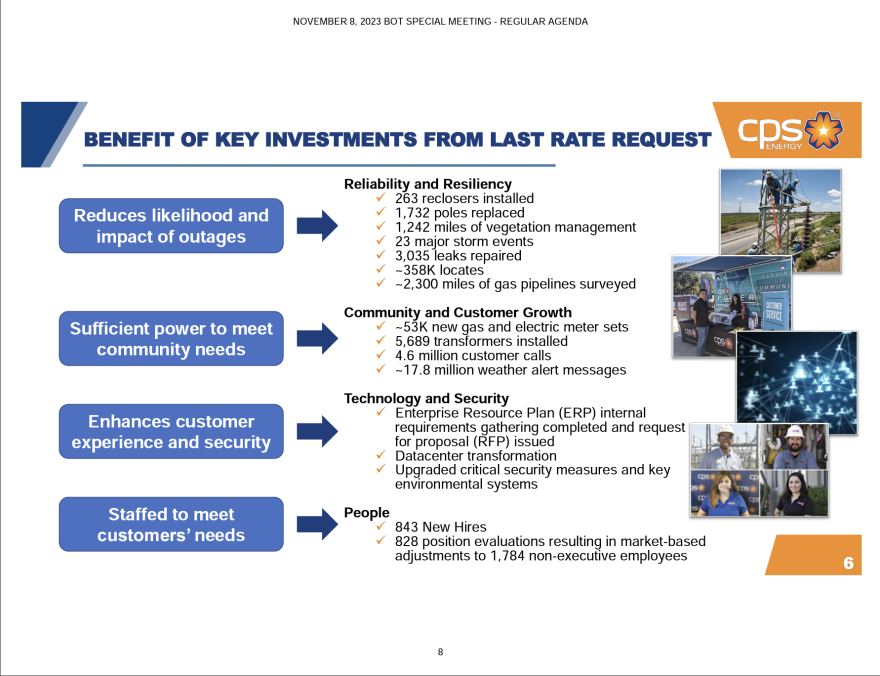Get TPR's best stories of the day and a jump start to the weekend with the 321 Newsletter — straight to your inbox every day. Sign up for it here.
CPS Energy estimated this week that its proposed 4.25% rate hike will generate $85 million in revenue. It will go into effect on Feb. 1 if the city council votes to approve it on Dec. 7.
The energy utility added that the average residential consumer would see a monthly increase in energy costs of $4.45 as a result of the rate hike. The average residential consumer who uses CPS Energy’s Affordability Discount Program (ADP) would see only half of the increase.
CPS explained that the new revenue will enable it to boost reliability and resilience, improve its technology and security, upgrade its infrastructure, and hire and train more workers.
Find CPS Energy’s summary on the rate hike proposal here.
Find CPS Energy’s full presentation on the rate hike proposal here.
CEO and President Rudy Garza said they need a rate hike increase two years after the last increase — and expect to ask for another rate hike in two more years — because the energy utility needs to make major investments. But it was directed by city council two years ago to increase its revenue gradually.
“We could probably justify a double-digit increase today if we really worked hard enough at it,” Garza said. “But because we feel like we’ve got a good strategy of coming in more frequently, then the increase shouldn’t necessarily need to be double digits at [one] time.”
The proposed rate hike presented to council on Wednesday is down from CPS Energy’s initial forecast of 5.5% as a result of unexpected record wholesale revenue this past year.
Progressive consumer rights advocacy nonprofit Public Citizen has been pushing the city to appoint an independent residential consumer advocate — one with expertise in energy and utility billing — to scrutinize the recommended rate increase and potentially give recommendations about how to embed conservation efforts into the rate structure.

DeeDee Belmares is a Clean Energy Advocate with Public Citizen’s Texas office. She said an advocate can double check CPS Energy’s work on behalf of San Antonio’s residents.
“This advocate could make recommendations to council versus them just rubber-stamping, possibly, another rate increase after two years of passing the last one,” she said.
Austin used an independent residential consumer advocate in its last rate hike consideration process, and an Austin ordinance requires it.
District 2 Councilman Jalen McKee-Rodriguez said during Wednesday’s briefing that he also supported appointing an independent residential consumer advocate.
“I would personally feel much more comfortable voting on something like this if CPS or the city hired a residential consumer advocate who can make a human, environmental, and compassionate request for a rate increase,” he said.
Garza pushed back against calls for an independent advocate.
“Nobody does more for our customers than CPS,” he said. “The advocates for our customers are sitting right behind you”.

Belmares and council members McKee-Rodriguez and District 3 Councilwoman Phyllis Viagran have pushed CPS Energy to institute a tiered rate structure, where customers would be charged different rates depending on their energy consumption.
A rate structure change was not included in CPS Energy’s proposal because Garza said the utility doesn't yet have the technology needed to institute that type of program even if it wanted to.
CPS Energy’s presentation of its proposed rate hike to city council included a summary of how the utility says it effectively used the funds from the last rate hike it asked for in 2021.

Some of the items on that list include the replacement of 1,732 electric poles, 3,035 leaks repaired, 4.6 million customer calls, 843 hires, and 5,689 transformers installed.
CPS Energy also announced that it would enhance the Affordability Discount Program along with the rate hike. Those enrolled in ADP would get a 50% discount on the rate hike, which will be funded by a $0.23 additional monthly fee for non-ADP residential consumers, which is included in the 4.25% increase.
Non-ADP residential consumers currently pay $0.60 per month to support the program and will pay $0.83 per month after the rate hike. CPS Energy will also expand ADP to make 15,000 more residential customers eligible — eligibility will expand to residents who spend more than 10% of their monthly discretionary income on energy.
The next steps
Wednesday was the first time CPS Energy had briefed city council on the rate hike proposal.
The city’s public utilities supervisor will provide recommendations about CPS Energy’s proposal to the city council on Thursday, Nov. 30.
CPS Energy’s board of trustees will vote to formally approve the rate hike request on Monday, Dec. 4.
Finally, the city council will vote up or down on the proposed rate hike on Thursday, Dec. 7.
If the rate hike is approved, it will go into effect on Feb. 1.
CPS Energy expects to request an additional rate increase for Fiscal Year 2027, which begins in January 2026.



